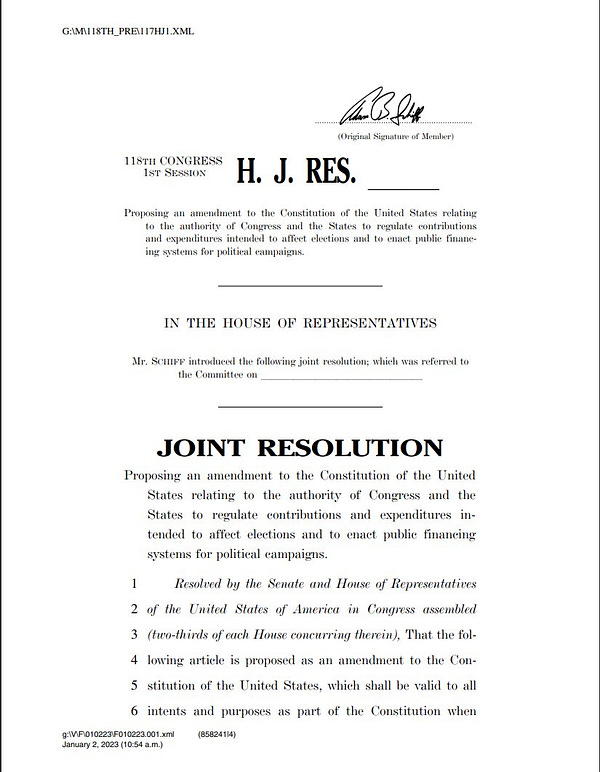House Democrats' 'Democracy For All' Amendment Seeks to End Corporate Personhood
Thirteen years after the Supreme Court handed down the disastrous Citizens United ruling, House Democrats have re-introduced a key bill to finally end the myth of "corporate personhood."
Photo by Filipp Romanovski on Unsplash
Yesterday marked the thirteenth anniversary of the Supreme Court case that re-wrote the political landscape.
On January 21, 2010, the nation’s highest court handed down its ruling on the controversial Citizens United v. Federal Elections Commission (FEC) decision equating political spending with free speech covered under the Constitution’s first amendment.
Under this ruling, the federal government is prohibited from interfering with corporations, nonprofit organizations, and unions from spending unlimited sums to support or oppose individual political candidates.
As long as they are not presenting funds to campaigns directly, corporations are free to dump as much as they want into political advertising and “super PACs” (political action committees) not required to disclose their donors’ identities.
It’s what former Massachusetts governor and 2012 Republican presidential nominee — now Utah Senator — Mitt Romney referred to in 2011 when he proclaimed “Corporations are people!”
While Citizens United was not the first high court decision to hand democracy to corporations, several prominent Democratic House members have introduced legislation to overturn it.
Reps. Adam Schiff (Calif.), Dean Phillips, (Minn.), Pramila Jayapal (Wash.), Gerry Connolly (Va.), and Jim McGovern (Mass.) have introduced the “Democracy For All Amendment” that would affirm congressional and state lawmakers’ constitutional authority to place restrictions on amounts of money donors can spend to influence elections. It would codify language declaring money does not equal free speech and corporations do not have the same rights as people, often referred to as “corporate personhood.”
According to Truthout:
The legislation would allow states to create systems to publicly finance elections. Public financing takes influence away from the wealthiest donors, giving more power to the public in the campaign donation sphere while incentivizing candidates to appeal to regular voters, rather than trying to court the support of the rich.
Rep. Schiff explained:
The flow of unrestricted corporate and dark money into our elections has dangerously eroded the American people’s faith in our democracy, and in our government’s ability to deliver for them and their families. To truly rein in dark money, we must amend our Constitution.

Schiff first proposed the amendment in 2013.
He said:
Citizens United was one of the most egregious enablers of special interest money, but it was only the latest in a long line of Supreme Court cases that opened the floodgates. The Democracy for All Amendment will close legal loopholes that wealthy megadonors, corporations, and special interest groups have exploited for far too long, and return power to the people once and for all.



Rep. Jayapal said:
In every election following Citizens United, billions of dollars of dark money have been dumped into our electoral system, giving corporations and the richest Americans outsized power and influence. It’s time to ensure our democracy works for all people by getting big money out of politics and ensuring every voter’s voice is heard.


Citizens United was not the first high court’s sop to corporations.
That distinction lies with the 1886 Santa Clara County v. Southern Pacific Railroad Company.
In 1976, the U.S. Supreme Court ruled in Buckley v. Valeo that political campaign spending limits are unconstitutional.
In 2014, the McCutcheon v. FEC case further solidified Citizens United by determining unconstitutional any limits on individual contributions to federal candidate committees and national parties over a two-year period.
Thanks to these decisions, a republican candidate with a right-wing billionaire like the Koch brothers or the Mercers in his or her pocket can render voters virtually superfluous.
A recent example of this is Heritage Action for America, the advocacy arm of powerful conservative think tank the Heritage Foundation, which spent spent $5.1 million in 2021 on lobbying efforts intended to suppress voting in key battle ground states.

But it is possible to make political bribery illegal again.
Consider Vt. Sen. Bernie Sanders’ campaign for the 2020 Democratic nomination that shattered fundraising records with just individual donations sans corporate influence, something most prior to his 2016 run for the White House assumed impossible in a post-Citizens United milieu.
It’s becoming more common now for Democratic candidates to refuse corporate backing.
In fact, corporate cash has become a blight on a candidate’s reputation.
With a republican House majority, though, is it likely the amendment will pass?
Possibly not.
That doesn’t mean Democrats should just roll over and let republicans hijack democracy for the next two years.
We need to reach out to our senators and House members, and tell them corporations are not people, and we support publicly financed elections.
The numbers for the Capitol switchboard are and 202–225–3121 and 202–224–3121.




